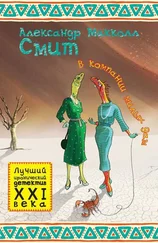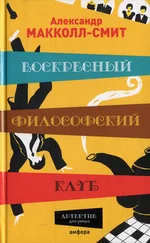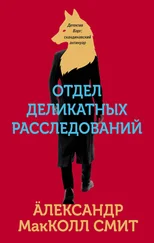The maid returned with the sugar and the tea was served. Mma Ramotswe noticed that Mrs took two spoonfuls and stirred them in vigorously. How did one remember that one took sugar, or were there some things that the body knew? Did those things – and perhaps things of the heart – survive the loss of memory, so that part of you, at least, was still there?
Over tea they talked about other matters. A neighbour’s dog had bitten a child and Miss Rose spoke at length about that. Then there was some discussion about the water pipeline to the north and a sale of work that had taken place at Riverwalk. Nothing was said about loss of memory or the identity of Mrs. It was, thought Mma Ramotswe, one of those gatherings where there is a topic that must not be discussed, but which sits sullenly in the corner.
Just as their conversation was winding down, Mr Sengupta appeared in the doorway and came to join them.
‘I heard voices,’ he said. ‘And I thought that I knew who one of them was.’ He smiled at Mma Ramotswe, who returned his friendly gesture.
Miss Rose explained that her brother often worked at home. ‘He has an office here in the house,’ she said. ‘He is always working, working, working. Even in the middle of the night you see him in his office – in his pyjamas.’
Mr Sengupta laughed. ‘Sometimes I am asleep at my desk. It looks as if I’m working, but I am actually sleeping.’
Miss Rose now stood up. ‘We should allow our guests to leave,’ she said. ‘They will have many other things to do.’
Mrs stood up too. Mr Sengupta glanced in her direction. ‘I hope these ladies will be able to help you,’ he said. ‘They are the best detectives in the country, I believe.’
‘I’m sure they are,’ said Mrs. ‘And I am appreciative of their efforts. If only I could get my memory back…’
She crossed the room to stand next to Mr Sengupta.
‘So, ladies,’ said Miss Rose. ‘We shall wait for your findings.’
As Miss Rose said this, Mma Ramotswe noticed that Mrs had half turned towards Mr Sengupta and was peering at the left shoulder of the blazer he was wearing. Then she suddenly brushed at the shoulder, as if removing a tiny piece of fluff. He barely took any notice of this, and continued to look at Mma Ramotswe in a slightly bemused way.
As they made their way towards the door, Mma Ramotswe promised to be in touch when further lines of enquiry had been worked out.
‘I hope that you will discover something,’ said Miss Rose. ‘Mrs is very keen to find out who she is so that she can go back to her own home and her own people.’
Mma Ramotswe nodded reassuringly. She had no idea, though, how they could possibly proceed in this case. But she wanted to try, because she had taken to Mrs, and could imagine how terrible it must be to find yourself cast adrift in the world, not knowing who you are or where you are, but aware that there must be people who are missing you and wanting you home.
As they drove back to the office she did not take Mma Makutsi to task. There was no point in that, as there would only be an argument. So she said nothing until Mma Makutsi herself spoke.
‘Swaziland,’ said Mma Makutsi. ‘The capital city is Mbabane, isn’t it?’
‘I believe it is,’ said Mma Ramotswe. But she did not wish to discuss Swaziland, or its capital. What she wanted to talk about was what she had seen.
‘Did you notice something, Mma?’ she asked. ‘When Mrs was standing next to Mr Sengupta back there, she brushed a piece of fluff off the shoulder of his blazer.’
‘I did not see that,’ said Mma Makutsi. ‘And I don’t see why that should be important.’
Mma Ramotswe wanted to ask: what does Clovis Andersen say? What does he write about observing the little, apparently unimportant things?
‘It might tell us something,’ said Mma Ramotswe. ‘It might tell us that Mr Sengupta and Mrs know one another quite well.’
‘Well, she is staying with them after all,’ pointed out Mma Makutsi.
‘Yes, I know,’ Mma Ramotswe said. ‘But don’t you think you only take fluff off the shoulders of somebody you have known for some time?’
‘No,’ said Mma Makutsi. ‘I don’t think that, Mma.’
Chapter Five
Men Often Fail to Take Finer Points
Mma Makutsi’s lawyer was a small man, a wearer of horn-rimmed spectacles and a carrier of a neat leather attaché case with the initials KD on the flap: Karabo Disang. She was already standing outside her newly acquired premises when he drove up and parked under one of the several acacia trees that dotted the yard surrounding the building.
‘Well, Mma Makutsi,’ Karabo Disang said briskly, in his rather loud voice. ‘Here you are in front of your new domain.’ He waved a hand towards the building. ‘The subjects of your lease, as we lawyers call it.’
‘I’m very pleased, Rra,’ she said. ‘It’s a very important moment for me.’ She looked at him expectantly. ‘You have the keys, Rra?’
The lawyer smiled as he flipped open the attaché case. Pulling out a bunch of keys, he dangled them ceremoniously before handing them over to Mma Makutsi. ‘I hope I’ve brought the right ones,’ he said dryly. ‘My office is full of keys, as I’m sure you will understand.’
The keys bore no label, which offended Mma Makutsi’s secretarial soul. One of the first things they had been taught at the Botswana Secretarial College was to attach labels to things. ‘Never forget,’ said the lecturer, ‘that things themselves have no idea what they are. A file cannot tell you what is in it.’ This witticism was greeted with laughter. ‘So label it, ladies! One little label now can prevent a lot of head-scratching in the future.’
And Mma Makutsi, sitting in the front row and thrilled to be at college at last, had written on the first page of her virginal notebook: One little label now can prevent a lot of head-scratching in the future. And here was a lawyer – of all people – failing to label a client’s keys.
‘It might be an idea to tie a tag to your keys, Rra,’ she suggested. ‘You know those brown tags with little pieces of string attached to them? You know those ones?’
The lawyer frowned. ‘I am too busy for such things, Mma. That is a secretary’s work.’
Mma Makutsi stared at him. She reached out, almost reluctantly, to take the proffered keys.
‘We lawyers are very busy,’ he went on. ‘We have to charge our time, you see. And if we sat about tying tags to keys, how could we charge that? You would have to work out whose key was which and then charge for that small amount of time that you spent tying a tag to it. It would be complex, Mma.’ He looked at her, as if to ascertain whether his point was understood.
Mma Makutsi’s eyes narrowed. ‘So secretaries are only for unimportant work? Is that your view, Rra?’
Mr Disang smelled danger. ‘Oh no, Mma. I would never say that. They are very important people. Without my secretary, do you know where I would be, Mma?’
She held him in her gaze. ‘Where is that, Rra?’
‘Nowhere, Mma,’ said Mr Disang, grinning in an ingratiating way. ‘She is the one who makes sure that everything runs smoothly. She is vital.’ He swallowed. ‘In every respect, Mma. In every respect.’
Mma Makutsi gestured to the building and began to walk towards it. ‘Should we inspect it, Rra?’
He was relieved to be in less contentious territory. ‘That is exactly what we should do, Mma. We should have a quick inspection – so that I can get back to the office and stop charging you.’
She stopped. There was silence apart from the chorus of cicadas. ‘You’re charging me now, Rra? For this visit? For talking about putting tags on keys?’
Mr Disang gripped his attaché case more tightly. ‘Oh no, Mma. That was careless of me. I wasn’t thinking, you see. There is no charge for this visit. Not a single pula , Mma. Not one.’
Читать дальше







![Александр Макколл Смит - Отдел деликатных расследований [litres]](/books/397661/aleksandr-makkoll-smit-otdel-delikatnyh-rassledova-thumb.webp)




